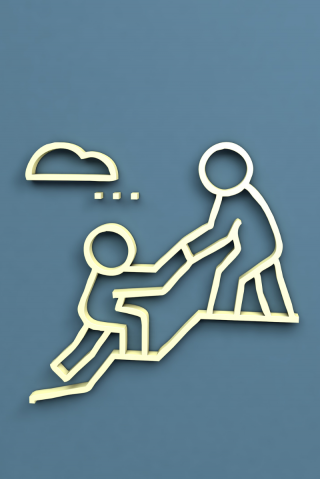Volunteering: Kirsty's Story
Kirsty Pool says that she always wanted to help others who struggled with mental health difficulties, so she applied to join Mind BLMK as a volunteer in early 2021. She completed her training to become a peer mentor and she was soon ‘matched’ with someone who needed support.
Peer Mentoring is a goal orientated one-to-one service offered through Mind BLMK where people will work with a trained mentor for up to 12 weeks – all of whom have lived experience of mental health challenges – to plan and carry out steps towards achieving goals to enhance their wellbeing or address a particular challenge they are facing such as improving social confidence, using public transport, accessing education, voluntary work, and employment.
Kirsty was furloughed at the time, and she says this was a great opportunity to give something back. She had volunteered in a care home, and she says she always had a passion to support people with mental ill health and felt that she could draw on her own experience to help others.
Because of Covid, Kirsty’s first mentoring was done via Zoom with her mentee, and they completed the 12 weeks after which her mentee didn’t want it to end but they were confident that she had reached a point where she was self-sufficient, and Kirsty could see the progress her mentee had made.
Kirsty is now supporting another mentee face-to-face, and she has also started as an employee with Mind BLMK. She said that an opportunity to become a peer support facilitator was shared with her and she immediately applied. She completed her interview, and she was offered the role the same day.
She says that she loves the work and she said that 40% of volunteers move on to work for Mind BLMK so that volunteering is a perfect way to move into this area of employment. Kirsty believes that if you have experienced mental health difficulties and have struggled through things in your own life and found a way to manage them, then by helping others, it can help to heal yourself.
There are challenges, such as trying to keep a mentee on track to achieve goals in a timeframe of 12 weeks, but she believes this support works for both mentor and mentee where there is shared learning.
Despite some challenges, Kirsty says the rewards are knowing that you’re making a difference as she always wanted to have a sense of purpose.
Kirsty says that if she met others who were considering volunteering in a mental health service, she would say
“There’s a big waiting list for people who need help and if you can make a positive difference to someone’s life, even just one hour a week, to help them get back on track, do it, it’s very rewarding.”
She says that it feels like she’s not doing a job when you do something you love.
Her role is now facilitating groups online and face-to-face, managing the waiting list, doing referrals, managing groups by helping them to run on time and making sure that people feel safe to speak and share their personal experiences to help them to find ways to achieve a sense of community, trust, connection, and purpose.
Kirsty says she will continue as a volunteer peer mentor as well as her paid role as peer support facilitator and she is highly valued in both roles.
If you are interested in volunteering to help someone with a mental health problem, or someone with issues that may be affecting their mental health, then view our current list of opportunities in Volunteering to Support Mental Health. All of our opportunities are with local charities and you can register your interest in them through our Simply Connect volunteering platform from which you can also search for other opportunities.
Do contact us with any queries you may have at:
email: volunteering@cvsbeds.org.uk
phone: 01234 354366

